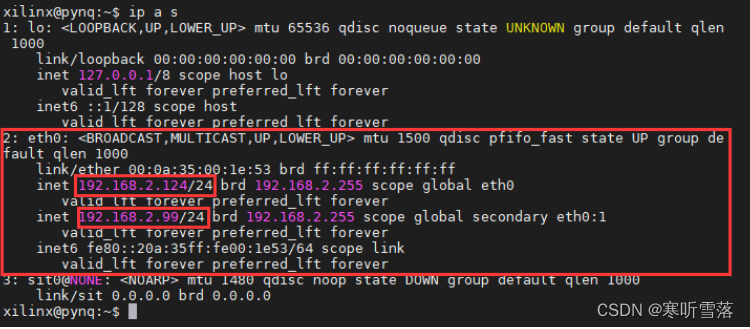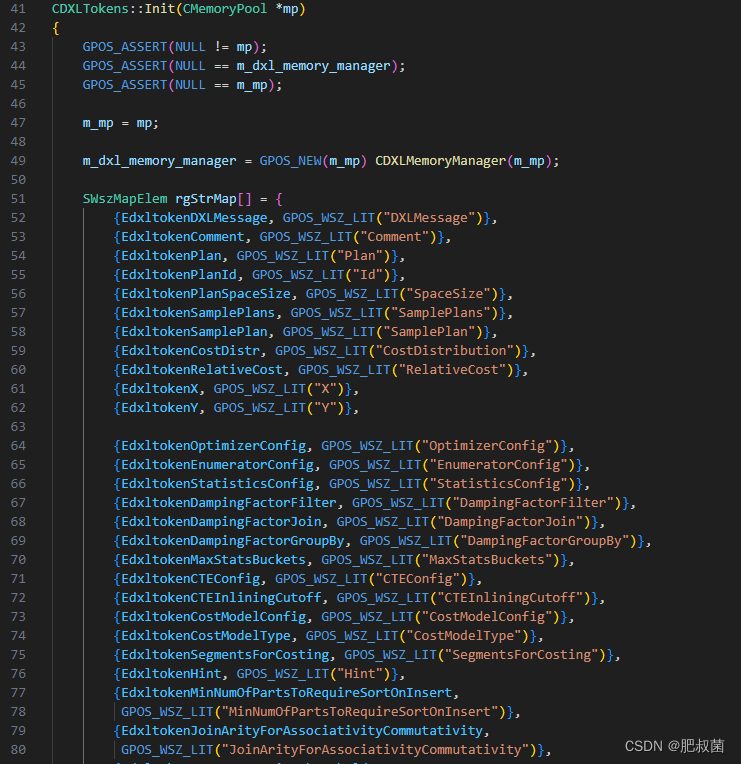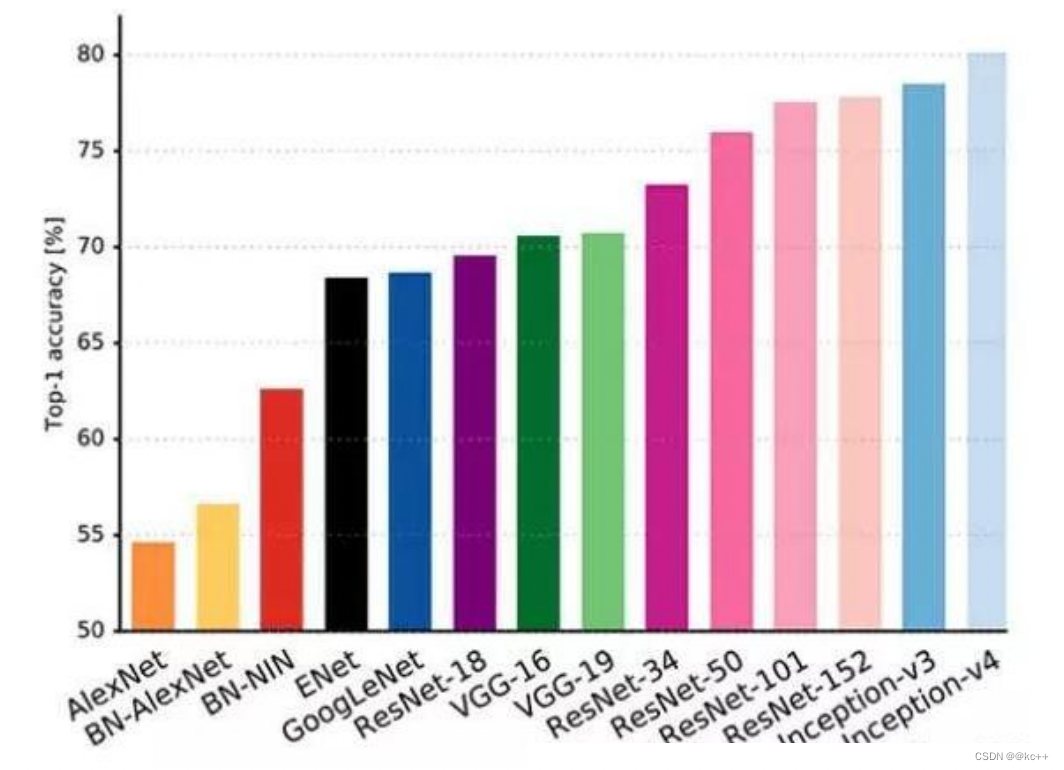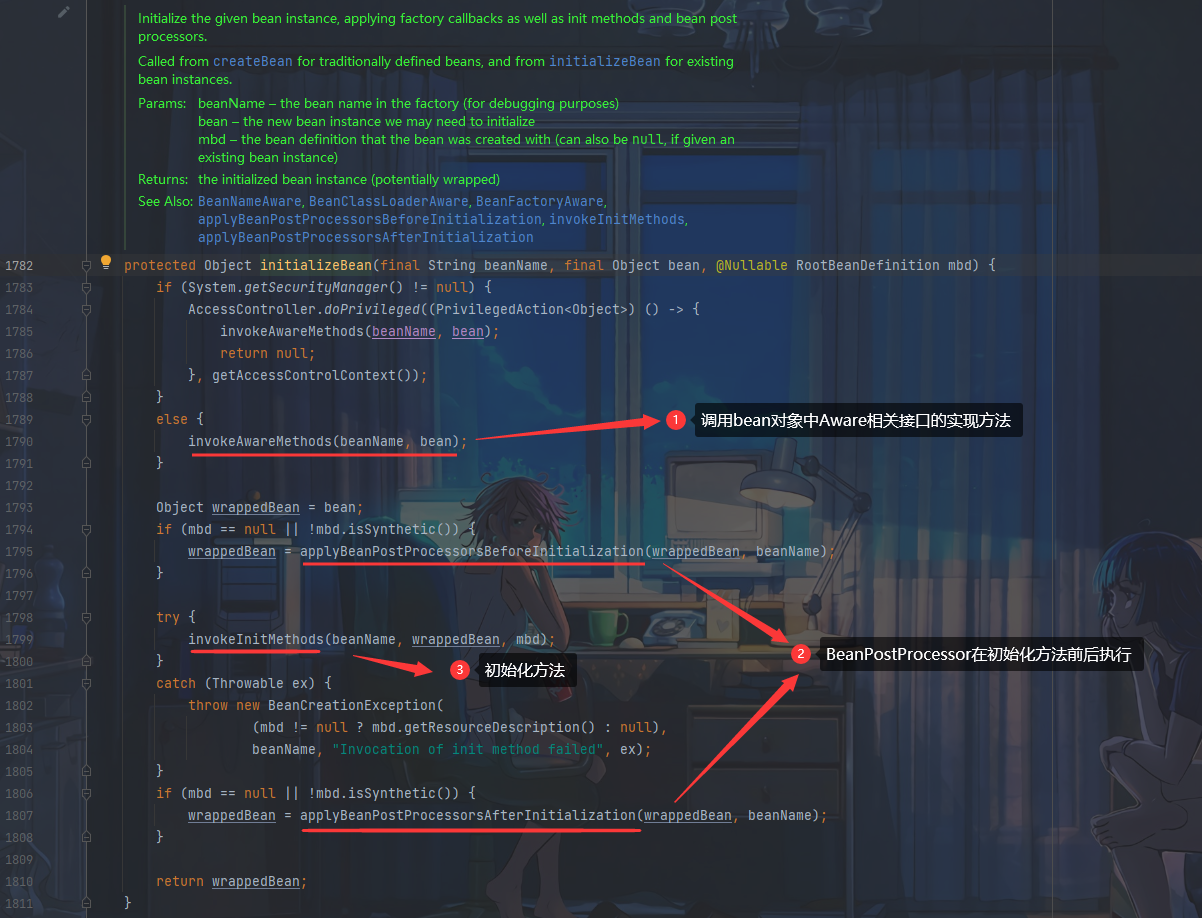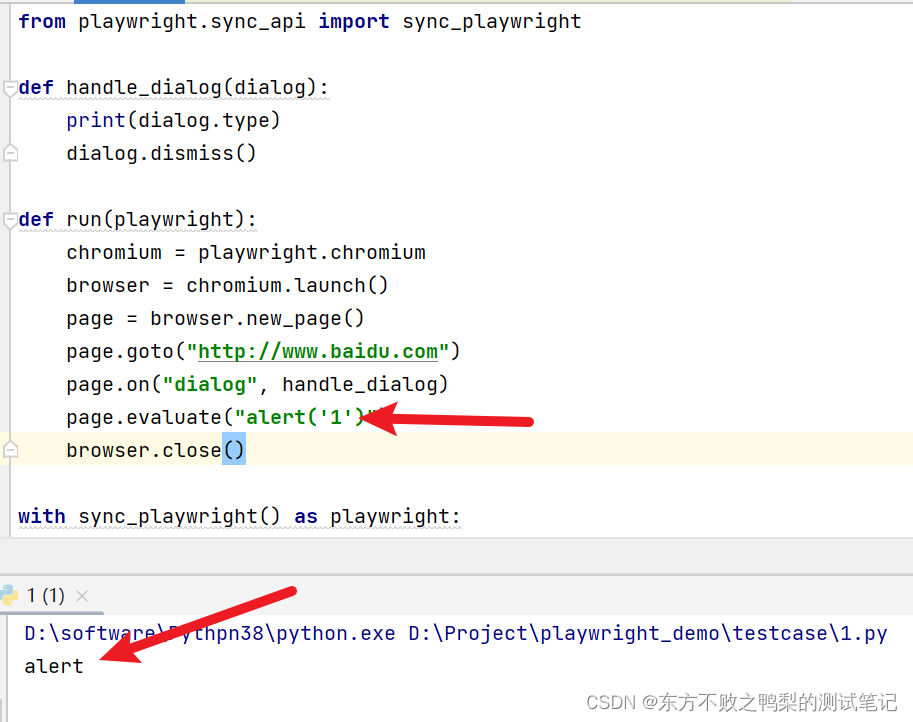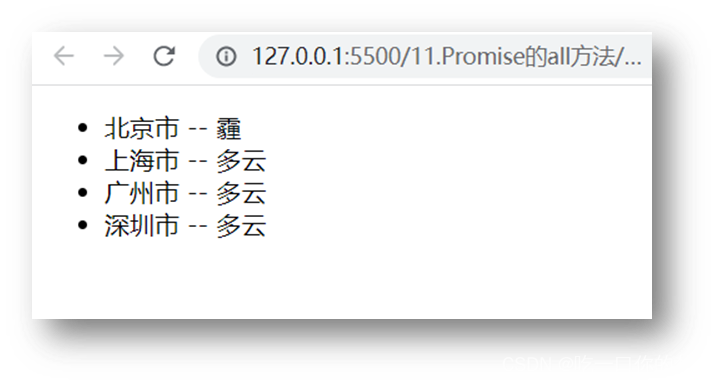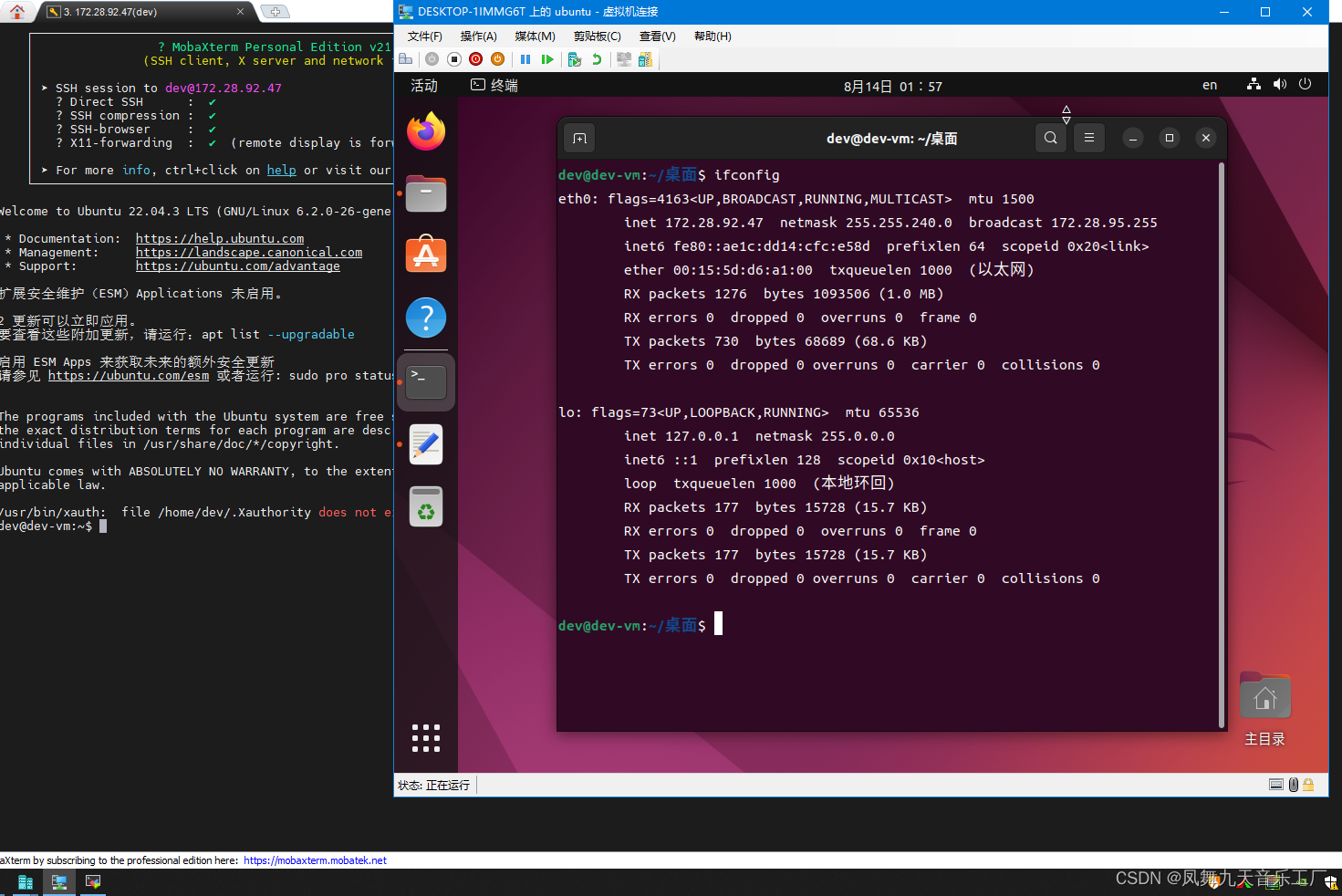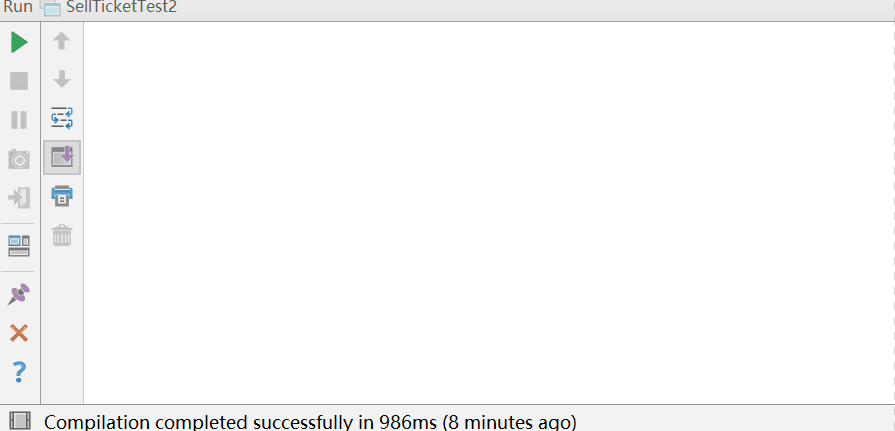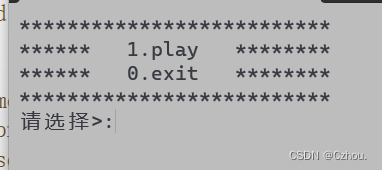一,安装 Win32diskimager
首先将Micro SD卡插入读卡器的卡槽中,然后再将读卡器插入计算机USB接口,此时计算机将会识别到插入的可移动磁盘。双击打开Win32DiskImager-1.0.0.zip 压缩文件,里面win32diskimager-1.0.0-install.exe文件:

解压缩后运行win32diskimager-1.0.0-install.exe,进入安装界面,勾选“I accept the agreement”并单击“Next ”按钮。

安装目录位置任意选,单击“Next”按钮进入如下图所示的选择开始菜单目录界面:
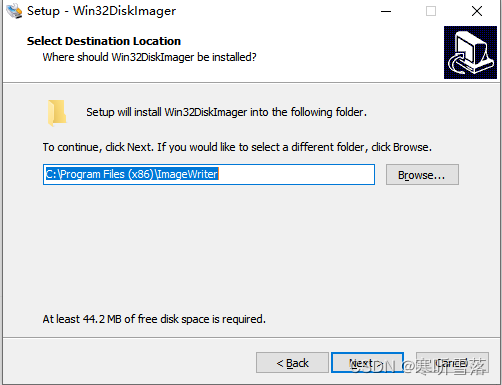
保持默认,单击“Next ”按钮,进入是否创建桌面快捷方式界面,如下图所示:
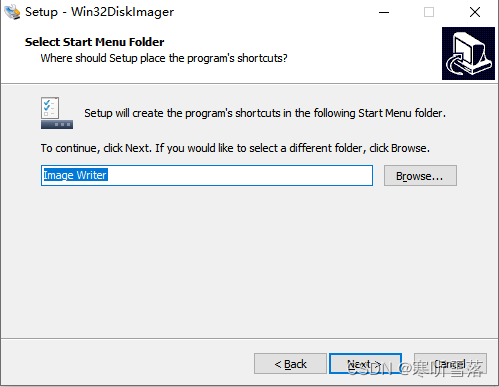
处勾选以方便后面查找,单击“Next ”按钮,进入最后的安装界面,如下图所示:

点击“Install”按钮,进行安装。
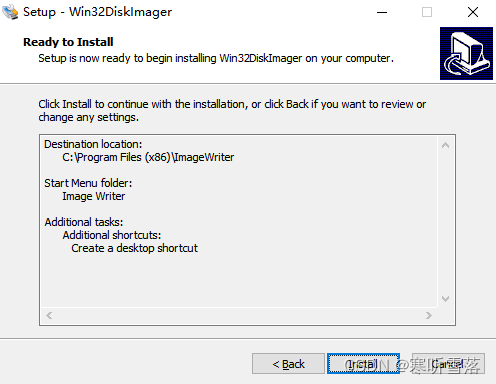
此处取消勾选“View README.txt”,单击“Finish”按钮,完成安装
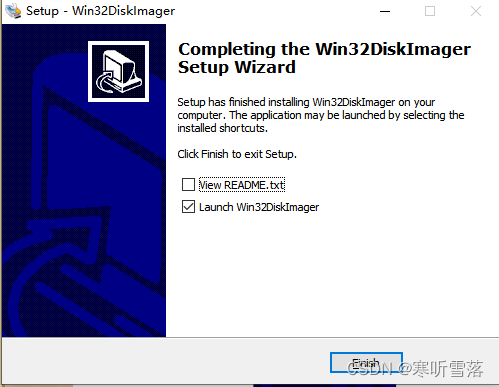
二,烧写镜像到SD卡
在弹出的Win32DiskImager使用界面中,看到Win32DiskImager的界面。需要做的只是选择包含要烧录的镜像文件的目录以及要烧录到的 USB 闪存驱动器设备。选择正确的文件路径,然后单击“写入”按钮就可以了。此处我们选择的 SD卡设备和PYNQ镜像文件:确保选择的 Micro SD 卡里面没有重要的文件,或已做备份。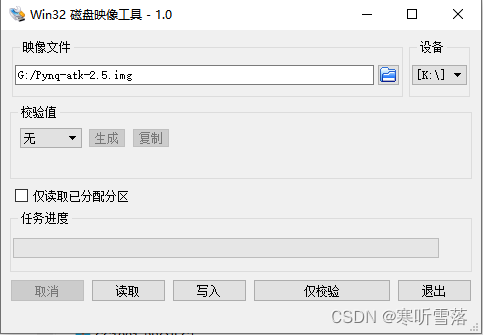
点击“Yes”按钮以继续
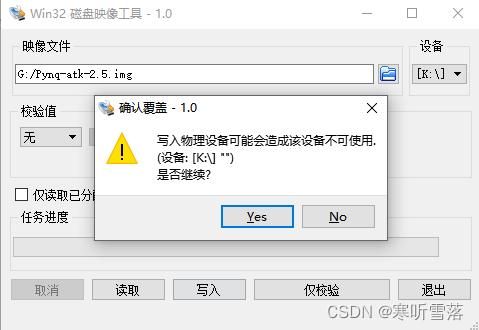
窗口将显示进度条以及传输速度,以便用户可以监视进度直至完成。由于PYNQ镜像较大会较慢。
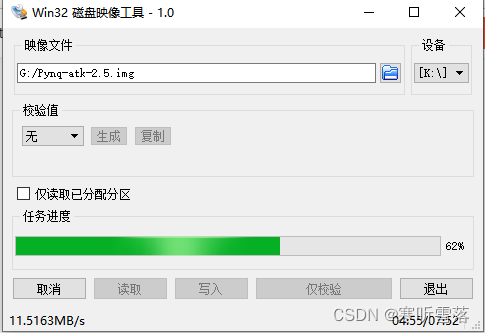
烧写完成后,将显示一个弹出消息,通知写入成功。
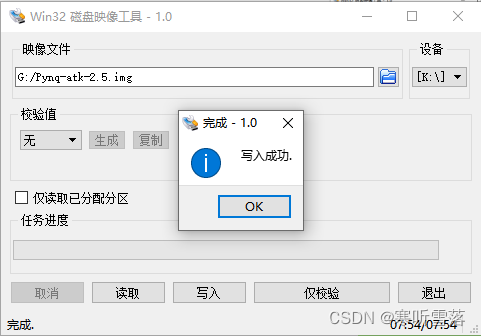
三,系统启动
打开串口助手,115200波特率
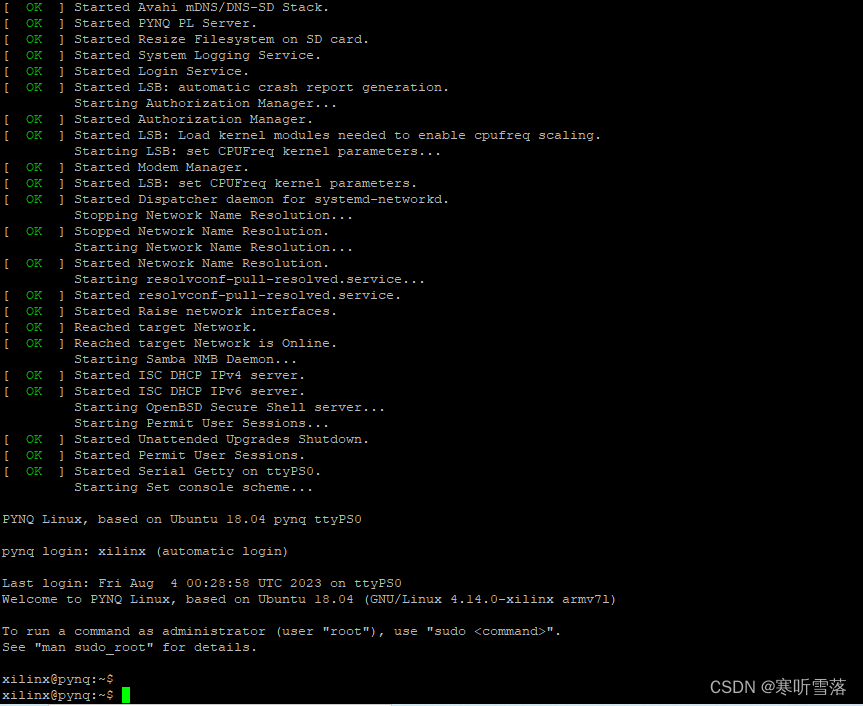
Welcome to PynqLinux, based on Ubuntu 18.04!
[ 5.417185] systemd[1]: Set hostname to <pynq>.
[ 5.819512] systemd[1]: File /lib/systemd/system/systemd-journald.service:36 configures an IP firewall (IPAddressDeny=any), but the local system does not sup port BPF/cgroup based firewalling.
[ 5.836715] systemd[1]: Proceeding WITHOUT firewalling in effect! (This warni ng is only shown for the first loaded unit using IP firewalling.)
[ 6.194812] systemd[1]: Started Dispatch Password Requests to Console Directo ry Watch.
[ OK ] Started Dispatch Password Requests to Console Directory Watch.
[ 6.237763] systemd[1]: Reached target Remote File Systems.
[ OK ] Reached target Remote File Systems.
[ 6.268275] systemd[1]: Created slice System Slice.
[ OK ] Created slice System Slice.
[ 6.298305] systemd[1]: Listening on Journal Socket.
[ OK ] Listening on Journal Socket.
[ 6.332870] systemd[1]: Starting Load Kernel Modules...
Starting Load Kernel Modules...
Starting Restore / save the current clock...
[ OK ] Listening on Syslog Socket.
[ OK ] Reached target System Time Synchronized.
Starting Remount Root and Kernel File Systems...
Starting Create Static Device Nodes in /dev...
Starting Nameserver information manager...
[ OK ] Listening on /dev/initctl Compatibility Named Pipe.
[ OK ] Started ntp-systemd-netif.path.
[ OK ] Listening on udev Kernel Socket.
[ OK ] Listening on udev Control Socket.
Starting udev Coldplug all Devices...
Starting Set the console keyboard layout...
[ OK ] Started Forward Password Requests to Wall Directory Watch.
[ OK ] Reached target Local Encrypted Volumes.
[ OK ] Listening on Journal Socket (/dev/log).
Starting Journal Service...
[ OK ] Created slice User and Session Slice.
[ OK ] Reached target Slices.
[ OK ] Created slice system-serial\x2dgetty.slice.
[ OK ] Started Journal Service.
[ OK ] Started Load Kernel Modules.
[ OK ] Started Restore / save the current clock.
[ OK ] Started Remount Root and Kernel File Systems.
[ OK ] Started Create Static Device Nodes in /dev.
Starting Load/Save Random Seed...
Activating swap /var/swap...
Starting udev Kernel Device Manager...
Starting Apply Kernel Variables...
Mounting Kernel Configuration File System...
Starting Flush Journal to Persistent Storage...
[ OK ] Started Set the console keyboard layout.
[ OK ] Started Nameserver information manager.
[ OK ] Started Load/Save Random Seed.
[ OK ] Reached target Network (Pre).
[ 7.470883] Adding 1048572k swap on /var/swap. Priority:-2 extents:5 across: 1843196k SS
[ OK ] Reached target Local File Systems (Pre).
[ OK ] Reached target Local File Systems.
Starting Set console font and keymap...
Starting Enable support for additional executable binary formats...
[ OK ] Activated swap /var/swap.
[ OK ] Started udev Coldplug all Devices.
[ OK ] Mounted Kernel Configuration File System.
[ OK ] Started Apply Kernel Variables.
[ OK ] Started Set console font and keymap.
[ OK ] Started Enable support for additional executable binary formats.
Starting Raise network interfaces...
[ OK ] Reached target Swap.
[ OK ] Started udev Kernel Device Manager.
[ OK ] Started Flush Journal to Persistent Storage.
Starting Create Volatile Files and Directories...
[ OK ] Found device /dev/ttyPS0.
[ OK ] Started Create Volatile Files and Directories.
[ OK ] Started Entropy daemon using the HAVEGE algorithm.
Starting Update UTMP about System Boot/Shutdown...
Starting Network Name Resolution...
Starting Network Time Synchronization...
[ OK ] Started Network Name Resolution.
[ OK ] Started Update UTMP about System Boot/Shutdown.
[ OK ] Started Network Time Synchronization.
[ OK ] Reached target Sound Card.
[ OK ] Reached target System Initialization.
[ OK ] Started Discard unused blocks once a week.
[ OK ] Listening on D-Bus System Message Bus Socket.
[ OK ] Started Daily apt download activities.
[ OK ] Started Daily Cleanup of Temporary Directories.
[ OK ] Listening on Avahi mDNS/DNS-SD Stack Activation Socket.
[ OK ] Started Message of the Day.
[ OK ] Started resolvconf-pull-resolved.path.
[ OK ] Reached target Paths.
[ OK ] Started Daily apt upgrade and clean activities.
[ OK ] Reached target Timers.
[ OK ] Listening on UUID daemon activation socket.
[ OK ] Reached target Sockets.
[ OK ] Reached target Basic System.
Starting LSB: automatic crash report generation...
Starting LSB: Load kernel modules needed to enable cpufreq scaling...
[ OK ] Started D-Bus System Message Bus.
Starting WPA supplicant...
Starting resolvconf-pull-resolved.service...
Starting Avahi mDNS/DNS-SD Stack...
[ OK ] Started Set the CPU Frequency Scaling governor.
Starting Dispatcher daemon for systemd-networkd...
[ OK ] Started ntp-systemd-netif.service.
[ OK ] Started Regular background program processing daemon.
Starting Login Service...
Starting Modem Manager...
Starting System Logging Service...
Starting Jupyter Notebook Server...
Starting Resize Filesystem on SD card...
Starting PYNQ PL Server...
[ OK ] Started ifup for eth0.
[ OK ] Reached target Host and Network Name Lookups.
[ OK ] Started resolvconf-pull-resolved.service.
[ OK ] Started WPA supplicant.
[ OK ] Started Avahi mDNS/DNS-SD Stack.
[ OK ] Started PYNQ PL Server.
[ OK ] Started Resize Filesystem on SD card.
[ OK ] Started System Logging Service.
[ OK ] Started Login Service.
[ OK ] Started LSB: automatic crash report generation.
Starting Authorization Manager...
[ OK ] Started Authorization Manager.
[ OK ] Started LSB: Load kernel modules needed to enable cpufreq scaling.
Starting LSB: set CPUFreq kernel parameters...
[ OK ] Started Modem Manager.
[ OK ] Started LSB: set CPUFreq kernel parameters.
[ OK ] Started Dispatcher daemon for systemd-networkd.
Stopping Network Name Resolution...
[ OK ] Stopped Network Name Resolution.
Starting Network Name Resolution...
[ OK ] Started Network Name Resolution.
Starting resolvconf-pull-resolved.service...
[ OK ] Started resolvconf-pull-resolved.service.
[ OK ] Started Raise network interfaces.
[ OK ] Reached target Network.
[ OK ] Reached target Network is Online.
Starting Samba NMB Daemon...
[ OK ] Started ISC DHCP IPv4 server.
[ OK ] Started ISC DHCP IPv6 server.
Starting OpenBSD Secure Shell server...
Starting Permit User Sessions...
[ OK ] Started Unattended Upgrades Shutdown.
[ OK ] Started Permit User Sessions.
[ OK ] Started Serial Getty on ttyPS0.
Starting Set console scheme...
PYNQ Linux, based on Ubuntu 18.04 pynq ttyPS0
pynq login: xilinx (automatic login)
Last login: Fri Aug 4 00:28:58 UTC 2023 on ttyPS0
Welcome to PYNQ Linux, based on Ubuntu 18.04 (GNU/Linux 4.14.0-xilinx armv7l)
To run a command as administrator (user "root"), use "sudo <command>".
See "man sudo_root" for details.